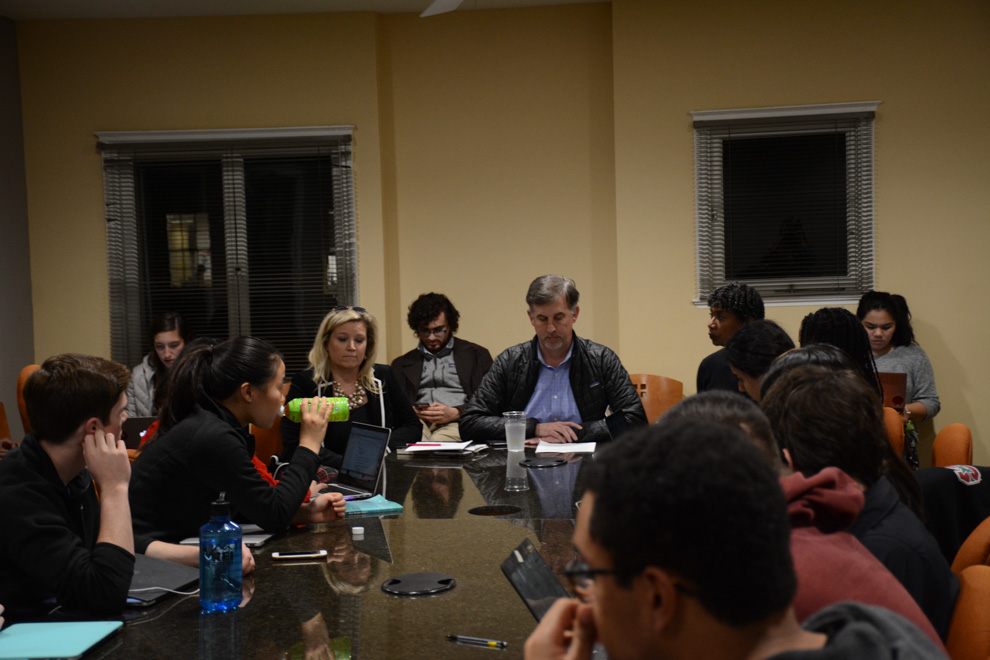Stanford is currently employing the services of Core Management Services (CMS), a “janitorial and custodial consulting company,” whose business model entails maximizing profit at the expense of custodial staff’s job security, health and overall well-being. As student activists who care deeply about service workers and their struggles for equity, we’ve been hearing troubling news from custodians who are worried about CMS’s preparations for the “time and motion study” Stanford has contracted it to perform in a transparent attempt to extract more labor from already overworked custodial staff. Representatives of the corporation have been interviewing workers about their day-to-day activities and have also been to every student residence to scope out the facilities.
Given these developments, Stanford’s Students for Workers’ Rights (SWR) calls on Stanford University to stop employing the services of Core Management Services (CMS). Continuing the employ the services of CMS would stand in direct contradiction to Stanford’s commitment in Section 10.1 of its Collective Bargaining Agreement with SEIU 2007 to “provide a safe and healthful working environment” for its service workers. Members of the Stanford community can support our cause by signing our petition, attending our open meeting next Sunday at 12 p.m. at BOB and signing up to be a student liaison for your custodial staff.
While Core Management Services is ostensibly a consulting firm that improves janitorial efficiency, a glance at its website reveals that it does so through measures that put profit over people. CMS promises that after its services are offered, “you will be paying less for your cleaning services, and your service providers, whether in-house or outsourced, will be delivering at a higher service level.” CMS does this by increasing the manual labor custodial staff have to conduct, disguising this exploitation as a “benchmarking process” which measures the cleaning ability of custodians against “top performers” by looking at variables like “square feet per custodian” and “cleaning production rates.” Stanford’s contracting of CMS to conduct a “time and motion study” is a transparent attempt to extract more labor from already overworked, understaffed and underpaid custodians. To clarify, SWR is not against Stanford updating its metrics on the work performed by custodial staff; rather, SWR condemns Stanford’s employment of a corporation that transparently prioritizes cost-cutting over workers’ well-being.
Custodial staff are a particularly vulnerable population of service workers at Stanford. In 2018, female custodians from United Service Workers West spoke to students about their vulnerability to harassment and assault due to their regular assignment to late night shifts alone. In that same year, custodial staff at Wilbur Hall reported extreme overwork, with only five people working eight buildings, meaning each employee would have to clean more than one building every night. One worker interviewed by SWR developed a pterygium in both eyes and had to undergo carpal tunnel surgery due to the physical strain of janitorial work.
This issue is a systemic one, as understaffing leaves key janitorial positions unfilled. As of the end of 2019, there remained several unfilled custodial positions at Stanford, with the oldest postings dating to June 2019, meaning they had been vacant for several months. Stanford, however, instead of raising wages and benefits to increase demand and to make custodial work sustainable with rising costs of living in the Bay, has decided to take exploitative cost-cutting measures through the services of CMS. Stanford can do better for its workers and its community by improving pay, benefits and job security as opposed to making already overburdened workers more “efficient.” It can also integrate its outsourced UG2 janitorial staff as full-time workers, making benefits and security available to them as well.
In summary, Students for Workers’ Rights demands that:
- Stanford, in particular Shirley Everett and Eric Montell of Residential and Dining Enterprises alongside other key decision makers in R&DE and Employee and Labor Relations, should end its affiliation with Core Management Services, as its business model prioritizes profit over custodial staff’s well-being.
- Stanford should be transparent with its timeline for this study, including which workers it plans to study, as these CMS agents are coming into student residences, our personal homes on campus.
- Stanford should be transparent with existing and future findings from the study, including the evaluation metrics, assessments and findings of CMS.
- Stanford should not apply any recommendations from findings CMS has already made before prior consultation with appropriate Union representatives, such as stewards of work sites and SEIU management. In particular, Stanford should not use any findings from CMS to justify layoffs.
- Stanford should address the systemic problem of understaffing by raising the wages of custodial staff to meet the increased living costs of the Bay Area.
- Stanford should end its outsourcing of janitorial staff by integrating current outsourced workers into full-time positions.
- Stanford should host an open town hall for students to express their concerns to R&DE regarding this study as well as other concerns related to working conditions.
Contact Ethan Chua at ezlc327 ‘at’ stanford.edu.
